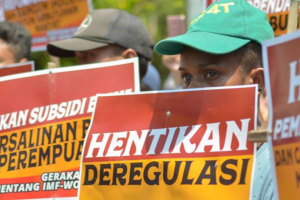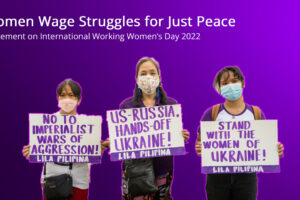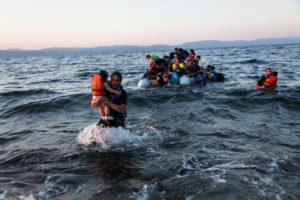Top to bottom: (1) Women line up during an aid distribution in Iraq. (2) Migrant camps in Greece. Refugee and migrant camps and settlements are ultra-vulnerable to diseases.
Decades of neoliberal policies have forced the majority, especially those from developing countries, to live in dire conditions that make them vulnerable to diseases. Many cannot follow the basic protective measures recommended by the World Health Organization[i] against the Coronavirus disease (COVID-19) such as proper hygiene and social distancing because of lack of access to water services, decent housing, and mass transportation.
While developed countries with well-functioning healthcare systems such as China, South Korea, and Italy have been devastated by COVID-19, the outbreak in developing countries could result in humanitarian crises. It is estimated that around 900 million people from least developed countries without resources are at risk from infection of the viral disease.[ii]
Amid the pandemic, support for vulnerable communities has become all the more urgent, and donors should be doubly pressured to fulfil their historical responsibility and extend humanitarian aid in addition to fulfilling official development assistance (ODA) and other previous commitments.
Last week, Norway initiated setting-up a multi-donor fund in the United Nations (UN) to help developing countries with limited healthcare systems respond to the COVID-19 pandemic. This move gained support including among civil society organisations (CSOs) such as IBON International, which has urged more donor countries to contribute to the initiative to extend aid to developing countries amid the pandemic. Following Norway’s initiative, UN launched a $2 billion-worth UN Global Humanitarian Response Plan against COVID-19. [iii] UN officials urged member states to support the plan while continuing with other existing commitments.
Norway has contributed NOK 90 million (USD 8.7 million) to the plan, and an additional NOK 15 million (USD 1.4 million) to the USD 75 million dollars that the UN Central Emergency Response Fund (CERF) has allotted for the plan.[iv] Member states have pooled a total of USD 3 million.[v] The funds will go to the implementation of health-based measures such as acquisition of laboratory equipment, provision of medical supplies, building of facilities to help the mobility of humanitarian workers, installation of handwashing stations in camps and settlements, and information drive. Meanwhile, the G20 has pledged a USD 5 trillion-worth world economic stimulus.[vi]
UN Secretary General António Guterres said that providing assistance to vulnerable communities amid the pandemic is “a matter of basic human solidarity.”[vii] But for such pronouncement to become real commitment instead of rhetoric, aid should not cater to donor countries’ or corporate interests, and instead be based on and shifted to people’s needs.
There should also be immediate and adequate support to people’s organisations (POs) and civil society who are working on the ground. The crucial role of POs and CSOs as local responders has been foregrounded amid travel restrictions that hamper the mobility of humanitarian efforts by UN agencies and other established organisations. Moreover, channelling aid to local POs and CSOs who are directly working with communities safeguards it from corruption and bureaucratic stumbling blocks, and ensures that timely help reaches those in need.
Drawing from the experience of the Ebola epidemic in West Africa, Norwegian officials said that assistance to developing countries must be situated in a “long-term response plan” to ensure its success and effectiveness. But a long-term response plan to COVID-19 should extend to a long-term plan to do away with all neoliberal schemes and overhaul the system.[viii] The pandemic has only expedited another crash of an already broken system—one that prioritises profit over people’s health, rights, and welfare. All actions in response to COVID-19 should be aligned with the demand for people-centred sustainable development as “in the long run, structural changes are needed to protect the people during health crises.”[ix]
[i] https://www.who.int/emergencies/diseases/novel-coronavirus-2019/advice-for-public
[ii] https://www.weforum.org/agenda/2020/03/coronavirus-least-developed-countries-response/
[iii] https://www.unocha.org/story/un-issues-2-billion-appeal-combat-covid-19
[iv] https://reliefweb.int/report/world/covid-19-pandemic-government-strengthens-humanitarian-efforts
[v] https://www.unocha.org/story/un-issues-2-billion-appeal-combat-covid-19
[vi]https://www.france24.com/en/20200326-we-will-overcome-coronavirus-crisis-vow-g20-leaders-after-video-meeting
[vii] [vii] https://www.unocha.org/story/un-issues-2-billion-appeal-combat-covid-19
[viii] https://iboninternational.org/2020/03/28/todays-pandemic-shows-a-need-for-system-overhaul/
[ix] https://iboninternational.org/2020/03/14/responses-to-the-coronavirus-must-defend-build-intl-solidarity-for-peoples-rights/



